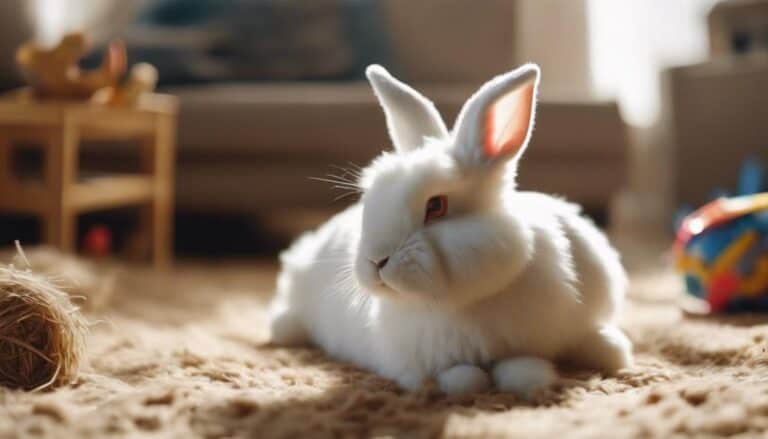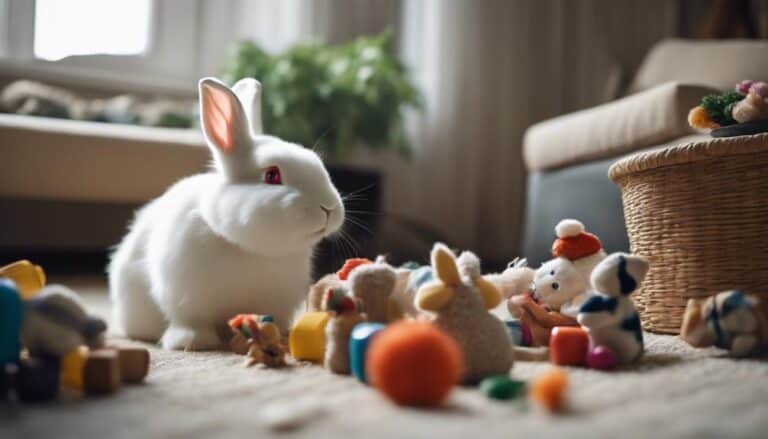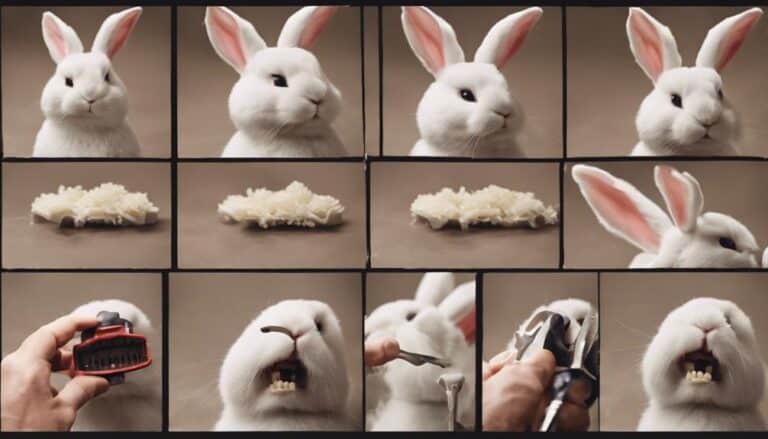Before bringing home your first bunny, did you ever stop to think about all the things you’d need to learn to give them a happy and healthy life?
Like, have you considered how you’ll bunny-proof your living space or what kind of food they need to stay healthy? These are just a few things you’ll need to figure out.
But there’s even more to it than that. Bonding with your bunny, socializing them, and knowing how to take care of their health are all crucial parts of being a great bunny parent.
If you don’t get these things right, it can make a big difference in your bunny’s quality of life.
So, let’s dive in and explore the essential things you should know before bringing home your first bunny.
Contents
- 1 Key Takeaways
- 2 Bunny-Proofing Your Living Space
- 3 Understanding Bunny Behavior and Needs
- 4 Establishing Trust With Your Bunny
- 5 Creating a Safe Play Area
- 6 Proper Bunny Diet and Nutrition
- 7 Importance of Socialization for Bunnies
- 8 Recognizing Signs of Bunny Distress
- 9 Bunny Healthcare Basics
- 10 Bonding With Your New Bunny
- 11 Conclusion
Key Takeaways
So you’re thinking of getting your first bunny? That’s super exciting! But before you bring your new furry friend home, there are a few things you should know to ensure a happy and healthy relationship.
First off, bunny-proofing your home is crucial to prevent hazards. Those little furballs can chew through almost anything, from electrical cords to your favorite shoes. So, make sure to rabbit-proof your home by removing any hazardous items, securing wires, and blocking off areas you don’t want them to access.
Understanding rabbit behavior and communication cues is also vital. Rabbits communicate differently than dogs or cats, and it’s essential to recognize their body language and vocal cues. For example, a thumping hind leg can indicate fear or anxiety, while a twitching whisker might mean they’re sensing danger.
Proper diet and nutrition are critical for your bunny’s health. Rabbits are herbivores and need a high-fiber diet rich in hay, veggies, and limited pellets. A poor diet can lead to health problems like obesity, digestive issues, and even death. Make sure to research and understand what foods are safe and healthy for your bunny.
Socialization and bonding are also critical aspects of rabbit care. Rabbits are social creatures that thrive on interaction and attention. Spend quality time with your bunny, handle them gently, and provide plenty of toys and stimulation to keep them happy and engaged.
Lastly, it’s essential to understand the critical aspects of health and wellness care for your bunny. Rabbits are prone to certain health issues, such as dental problems, respiratory infections, and parasites. Regular veterinary check-ups, monitoring for signs of illness, and knowing what to look out for can help prevent or detect health problems early on.
Bunny-Proofing Your Living Space
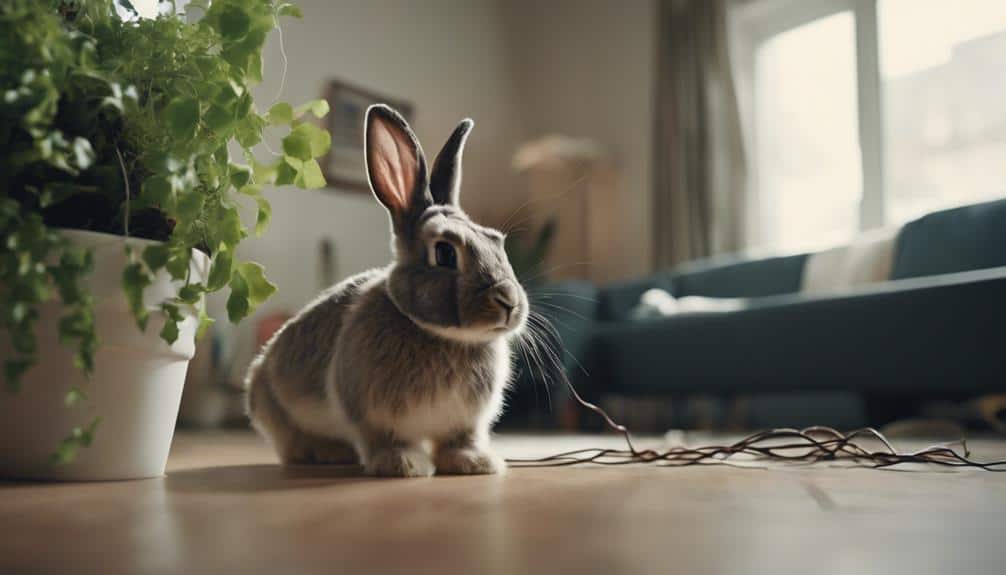
So, you want to make sure your new bunny stays safe and happy in their new home. That means you need to bunny-proof your living space. Rabbits are naturally curious, and they love to explore, chew, and dig. If you don’t take some precautions, they might get hurt or get into trouble.
You need to protect your wires and baseboards from those curious rabbit teeth. Use protective covers or cord concealers to prevent electrical shock or fire hazards. And don’t forget to keep toxic materials and hazardous substances out of reach. Store cleaning products, medications, and chemicals in a safe place where your bunny can’t get to them.
Create a safe environment for your bunny by blocking off areas with rabbit gates or exercise pens. This will prevent them from escaping or getting injured. Remove any sharp objects, hot surfaces, and heavy furniture that could harm your bunny. And when it comes to furniture and decor, choose rabbit-safe materials like untreated wood and non-toxic fabrics. This will prevent your bunny from ingesting or being exposed to harmful substances.
Understanding Bunny Behavior and Needs
Before bringing a bunny into your home, it’s essential to understand their behavior and needs.
Rabbits communicate in various ways, including body language and vocalizations. They use body language to express emotions like fear, anger, or contentment. For instance, a bunny that’s feeling threatened or scared might flatten its ears or thump its hind legs. On the other hand, a happy bunny might twitch its whiskers or nuzzle its head against you.
Rabbits are natural-born explorers and love to play. They need plenty of space to move around, climb, and dig. Providing toys and activities that stimulate their natural behavior will keep them engaged and entertained. For example, you can offer cardboard boxes or paper bags for them to dig and chew on.
A bunny’s diet is critical to its health. Rabbits are herbivores and need a high-fiber diet rich in hay, grass, and vegetables. Avoid feeding them too many treats or high-protein foods, as these can cause health problems. Fresh water should always be available, and their living space should be clean and well-ventilated.
Basic Bunny Behaviors
Understanding your bunny’s behavior is key to keeping them happy and healthy. When you bring a new rabbit home, remember they’re social creatures that thrive in pairs or groups. However, introducing multiple rabbits to each other can be tough and requires patience.
Each rabbit has its own unique personality, and they can be a bit mischievous at times. They prefer to have their feet on the ground, rather than being held, which makes them feel secure.
Rabbits are super smart and can outsmart even the most attentive owners. So, approach them on their own terms and give them time to trust you. Female rabbits can be especially moody, and their behavior may change over time. Be patient and understanding with them.
Regular exercise, mental stimulation, and a safe environment are essential for their well-being. Providing Timothy Hay, a staple in rabbit care, helps maintain their dental health and digestive system.
Essential Care Needs
Caring for your bunny starts with recognizing and meeting their essential behavioral and physical needs. Rabbits are high-maintenance pets that require more care than you might think.
For instance, you need to establish a routine for cleaning their litter box regularly. This is necessary to prevent health issues and promote their well-being. If you don’t, it can lead to some serious problems.
When it comes to food, you need to provide your rabbit with a balanced diet of high-quality hay, limited pellets, and fresh vegetables. This is imperative for their digestive health. One thing to keep in mind is to avoid feeding them a whole carrot, as it can lead to digestive problems.
Your rabbit also needs plenty of space to roam and exercise. A hutch alone isn’t enough; they need access to a safe outdoor area for regular playtime and physical activity.
Regular vet check-ups are also essential for your rabbit’s overall health and well-being. These visits can help detect any health issues early on and keep your bunny in top condition.
Establishing Trust With Your Bunny
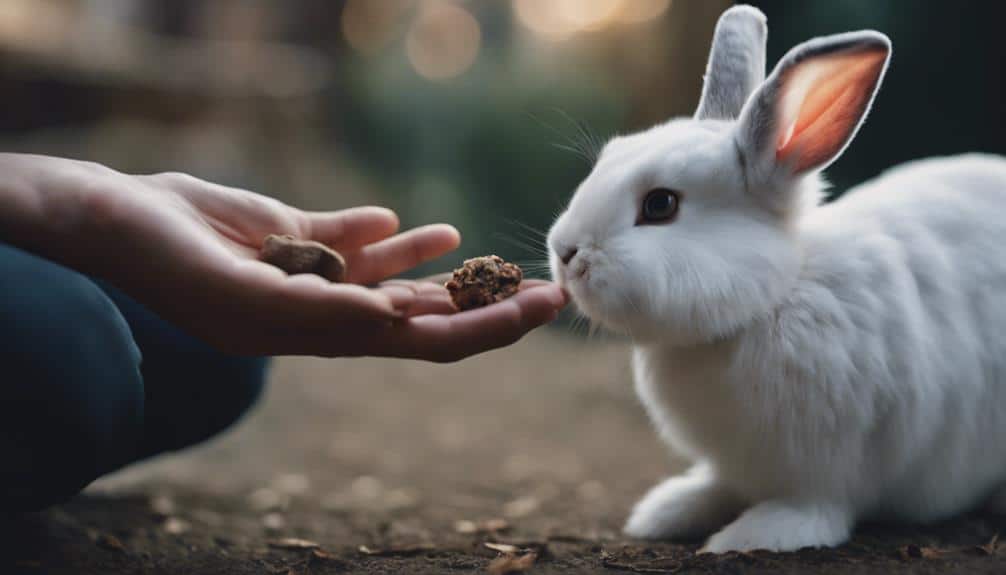
Building a strong foundation of trust with your new bunny is crucial for a happy and healthy relationship. To gain your bunny’s trust, you’ll need patience, consistency, and understanding.
First and foremost, you need to spend quality time with your bunny. Dedicate some time each day to bond with them. Sit near them, talk softly, and offer treats to create positive associations. This will help your bunny feel comfortable around you.
When approaching your bunny, do it calmly and gently. Avoid sudden movements or loud noises, which can scare them. Instead, slowly reach out your hand for them to sniff before attempting to pet them. This will help them get used to your presence.
Respecting your bunny’s boundaries is also essential. Bunnies need their space, so allow them to come to you at their own pace. Don’t force interactions, as this can create fear and mistrust.
Establishing a consistent routine is vital for building trust. Create a predictable schedule for feeding, playtime, and grooming. Consistency helps build trust and comfort, making your bunny feel more secure.
Finally, use positive reinforcement to encourage good behavior. Reward your bunny with treats and gentle praise when they behave well. Positive experiences will encourage trust and strengthen your bond.
Here’s a quick summary of the tips to establish trust with your bunny:
| Tips for Establishing Trust with Your Bunny | Description |
|---|---|
| Spend quality time together | Dedicate time each day to bond with your bunny. |
| Approach them calmly and gently | Avoid sudden movements or loud noises. |
| Respect their boundaries | Bunnies need their space. |
| Be consistent with care and routine | Establish a predictable schedule. |
| Use positive reinforcement | Reward good behavior with treats and gentle praise. |
Creating a Safe Play Area
When you’re setting up a safe play area for your bunny, the first thing to do is to bunny-proof the space.
That means removing any wires or toxic substances that could harm them. You want to create a peaceful environment with minimal noise, which will help reduce stress and anxiety for your furry friend.
A rabbit-proofed room or area is essential for their exercise and well-being.
Make sure it’s equipped with safe toys and accessories that your bunny can enjoy. This will give them the freedom to hop around, play, and be themselves without you worrying about their safety.
Bunny-Proofing Your Space
To create a safe play area for your bunny, keep all wires, toxic substances, and hazardous materials out of reach. Rabbits love to explore and chew, so protecting wires and baseboards is vital. They can get hurt or make a mess if they get to these things.
Get down on your bunny’s level to identify any potential hazards or escape routes. Think like a bunny! Consider investing in some playpens or gates to create a safe zone where your bunny can roam freely without getting into trouble. Remember, bunnies are curious creatures, so supervision is key.
Guarantee that all toxic items like cleaning products and hazardous substances are safely stored away. Providing a designated litter box can help in training your bunny and keeping the play area clean.
Safe Toys and Accessories
To ensure your bunny has a fun and safe space to play, you need to get the right toys and accessories.
When picking out toys, go for safe and durable ones that won’t pose a choking hazard. Some great options are untreated wicker toys, cardboard rolls, and hay balls. You can find these at your local pet shop or even make your own DIY toys from household items like cardboard boxes.
Rabbits love to chew, so you need to protect electrical cords from getting damaged. Use cord protectors or hide them in cardboard boxes or paper towel rolls. Also, double-check that the play area is free from toxic substances, sharp objects, and small items that could be ingested.
Rabbit Toys:
- Untreated wicker toys
- Cardboard rolls
- Hay balls
Interactive Toys:
- Puzzle toys
- Treat-dispensing toys
- Hiding places
Proper Bunny Diet and Nutrition

For your bunny to be at their best, their diet should include a mix of high-quality hay, fresh veggies, and limited pellets specifically made for rabbits.
When it comes to your new rabbit’s diet, hay should be the star of the show, making up about 90% of their daily food intake. This helps prevent digestive issues and promotes healthy teeth.
You should also give them fresh veggies like leafy greens, carrots, and bell peppers. Just remember to introduce new foods gradually so you don’t upset their stomach.
In addition to hay and veggies, you can give them a small amount of pellets designed specifically for rabbits. However, these should only make up about 10% of their diet.
Always make sure they’ve access to fresh water, and check their water source daily to ensure it’s clean and working properly.
One important thing to remember is to avoid giving your bunny sugary, fatty, or salty foods like chocolate, nuts, or processed snacks. These can lead to serious health problems.
Importance of Socialization for Bunnies
Rabbits are social animals, and their early interactions with you and their new environment really shape their behavior and personality. This is why socialization is a big deal for bunnies.
When you bring a new bunny home, especially if it’s your first pet bunny, it’s super important to start socializing them early – around 8 weeks old is a great time to start. This helps them trust you and gets them comfortable with your presence. Gentle handling, feeding, and spending quality time with your bunny can make a huge difference. It helps them become more confident and less stressed, which can even prevent health issues down the line.
A bunny that’s well-socialized is usually friendly, curious, and adaptable to new situations. This makes it way easier for them to adjust to changes or new environments. And the best part? By spending regular time with your bunny, you can build a strong bond with them. This leads to a happy and fulfilling relationship for both you and your furry friend.
Recognizing Signs of Bunny Distress

Recognizing signs of distress in your bunny is crucial for their well-being. When you first bring your pet rabbit home, you might wonder how to interpret their subtle cues of discomfort. Bunnies are sensitive creatures, and understanding their body language is key to their care.
So, what’re the signs of distress you should look out for? One common indicator is teeth grinding. If your rabbit grinds its teeth, it could be a sign of pain or discomfort. Also, if your bunny becomes unusually aggressive or withdrawn, it may be a red flag for distress.
Changes in eating habits or sudden weight loss can also indicate a problem. Another key sign is excessive grooming or fur pulling, which may suggest stress or an underlying health issue. If you notice your bunny displaying any of these behaviors, it’s essential to seek advice from a veterinarian experienced in rabbit care promptly.
Bunny Healthcare Basics
Regular check-ups with a vet are crucial for keeping your bunny healthy. Without them, health issues can sneak up on you.
A vet who knows their stuff about rabbits is super important because rabbits need their teeth checked regularly. If not, they can develop spurs, which can be painful and cause problems.
Monitoring your rabbit’s health is vital. If you notice any changes in their poop or behavior, it’s time to get them to the vet.
Rabbits can go downhill fast – sometimes within just 24 hours if they stop eating and pooping. That’s why common health issues like teeth problems and stasis can be avoided with regular vet visits and a good diet.
To give your rabbit the best care, find a vet who’s experienced in handling rabbits. Not all vets are equipped to provide the specialized care these delicate creatures need.
Investing in your rabbit’s health now will save you from potential heartache in the future.
Bonding With Your New Bunny
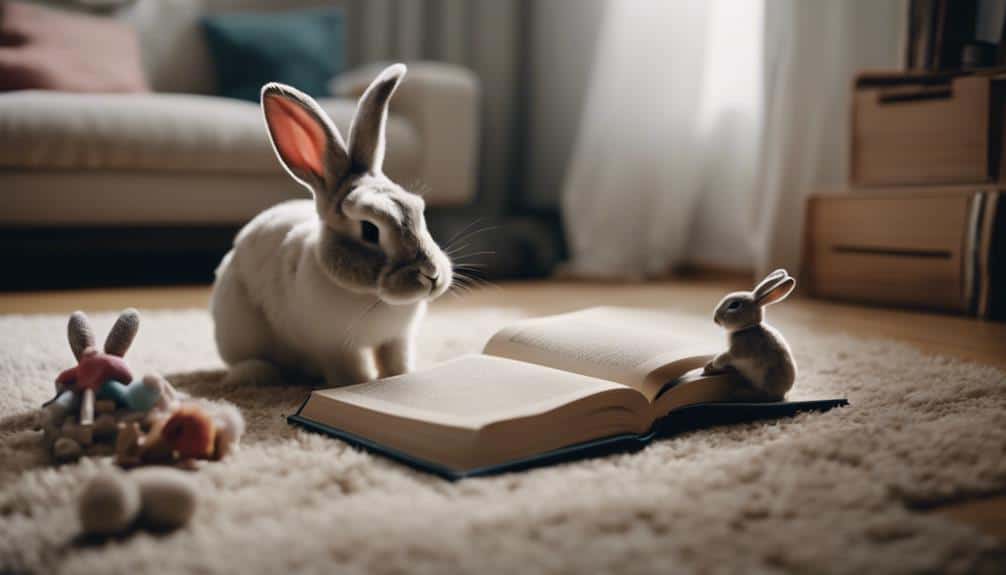
Monitoring your rabbit’s health is crucial, but equally important is building a strong bond with your new bunny to promote their overall well-being and happiness.
When you’re trying to bond with your new rabbit, patience and understanding are key. You need to remember that your bunny might be feeling nervous or scared in their new environment, so it’s essential to move at their pace.
Spending quality time with your new rabbit every day is vital. This allows them to get accustomed to your presence and scent. Try sitting quietly with your bunny, letting them hop around you, or simply placing them on your lap.
Offering your bunny treats by hand is another great way to create a strong bond. This creates positive associations and strengthens the connection between you. Just be sure to choose healthy treats and only offer them in moderation.
If you’re adopting a rabbit, consider going through a rabbit rescue organization. These groups often have valuable insights into the rabbit’s background and personality, which can be super helpful in the bonding process.
Conclusion
Bunny-proofing is a must. Rabbits love to chew, so make sure to remove any hazardous items from their reach. This includes electrical cords, toxic substances, and fragile decorations.
Also, establish trust with your bunny by moving slowly, speaking calmly, and letting them come to you. This will help them feel comfortable and secure around you.
Creating a safe environment is vital. Provide a spacious cage or enclosure that’s escape-proof and protected from predators. Make sure they’ve plenty of hiding places, toys, and climbing structures to keep them stimulated and active.
Also, recognize signs of distress, such as rapid breathing, pacing, or hiding, and take action to alleviate their stress.
Take the time to educate yourself on bunny care and behavior. This knowledge will help you provide the best possible care for your new pet, strengthen your bond, and ensure they live a happy and healthy life. Additionally, understanding their specific needs, such as diet, exercise, and social interactions, will enhance your experience as a bunny owner. If you’re wondering where to find bunnies to pet, consider visiting local shelters or rescue organizations that specialize in small animals. These places often have knowledgeable staff who can guide you in choosing the right bunny for your lifestyle and ensure you have all the resources necessary for their care.



